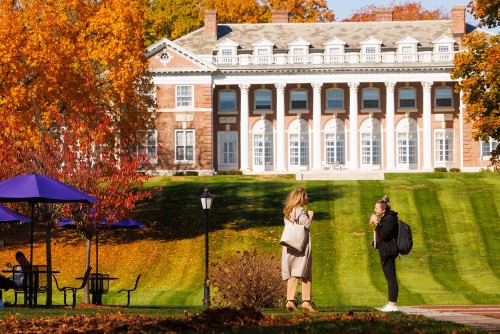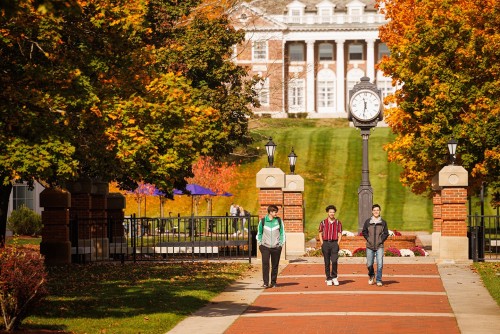Chemistry Major & Minor
Stonehill adeptly combines technical training with the liberal arts so that its graduating chemistry majors are not only superb scientists but also well-rounded lifelong learners.
The Role Model and Mentor Behind Countless Successful Science Careers
For more than 20 years, Dr. Marsha A. Moses ’75 has welcomed Stonehill science students and grads to her Boston Children’s Hospital lab. The impact has been profound.
Combining a Cutting-edge Approach with Time-tested Methodology
Stonehill’s Chemistry program covers the traditional chemical disciplines as well as those disciplines that will have the strongest impact on society in the future. Students learn to think broadly, creatively and independently.
Degree Options to Suit Your Goals
The Chemistry B.S. is designed for students desiring a thorough background in the field of chemistry in preparation for either graduate school or industrial employment in which the main focus of the work is in chemistry. A bachelor’s degree qualifies graduates for entry-level positions such as:
- Research associate
- Quality control chemist
- Environmental and regulatory compliance chemist
A doctoral degree is required to oversee basic industry research, to supervise government laboratories and for college and university faculty positions.
The Chemistry B.A. is appropriate for students interested in professional school, direct employment in industry, or entry into a non-traditional field combining the knowledge of chemistry with another discipline. This degree provides the flexibility to double major or minor in another field of study, for example education. Professional schools attended by graduates include:
-
Medical
-
Dental
-
Optometry
-
Forensics
-
Nurse practitioner and physician assistant programs
Stonehill College offers a 3+2 Engineering Program in collaboration with The University of Notre Dame. Students in the 3+2 Engineering Program receive a B.A. in Chemistry from Stonehill College and a B.S. in Chemical Engineering from the University of Notre Dame.
The Chemistry minor provides a strong understanding of fundamental principles and techniques of chemistry as well as the application of those principles to biological, environmental and industrial processes.
The Flexibility to Pursue Other Interests
One aspect that sets Stonehill’s Chemistry program apart from others is that students have a chance to do more than just science. If they are pursuing a second major or are involved in athletics, the Department does its best to adjust class schedules to try to accommodate students. Many schools only offer labs in the afternoon, which forces some students to choose between athletics and science. Stonehill offers labs in both the morning and the afternoon.
Three Things to Know About the Program
Unless they are in class or a meeting, chemistry faculty members are almost always in their offices at any given time on weekdays, and they are available to students at other times by text, email, phone and social media. Every student is known on a personal level by several professors.
The Department also tailors its offerings to meet your scheduling needs. This helps make Stonehill more cost effective than other schools, where it’s more likely to take more than four years to graduate, driving up tuition and boarding costs.
At Stonehill, science students get to use equipment that, at other schools, is often only available to faculty or graduate students. A High Field Nuclear Magnetic Resonance Spectrometer, for example, is a $230,000 instrument that our chemistry majors are using the first semester of their first year.
Recent Accolades
Organizations involved in assessing U.S. colleges and universities continually cite Stonehill as being among the best in the nation when it comes to value, outcomes and a commitment to making the world a better place. See full list of accolades.
-
U.S. News Ranks Stonehill in the Top 5% Nationally
After assessing U.S. colleges and universities based on 17 measures of academic quality and graduate outcomes, U.S. News & World Report ranked Stonehill No. 73 in the Best Value category out of 1,500 colleges, while also moving up to No. 83 among National Liberal Arts Colleges.
-
Wall Street Journal 2025 Rankings Place Stonehill Among Best Colleges in U.S.
Stonehill College has been recognized again this year by The Wall Street Journal for the value it provides students, especially in the areas of career preparation and character development.
-
Money Ranks Stonehill Among Best U.S. Colleges in 2024
Money’s 2024 Best U.S. Colleges research shows Stonehill among top 10% nationwide.
Sample Courses
Sequence of Introductory Courses
Seminar & Thesis
Graduate & Professional School Placements
Over half of Stonehill chemistry and biochemistry graduates continue their education in graduate or professional school.
Outside Partnerships & Special Programs
Save Money: Earn Two Degrees in as Little as Four Years
Career Placements
Stonehill chemistry graduates have found employment as analytical chemists, synthetic chemists and pharmaceutical chemists. We also have recent graduates teaching chemistry and others working as forensic chemists.
By the Numbers
Stonehill’s Chemistry program enables students to obtain skilled technical positions after graduation or continue their education in graduate or professional school.
The early career salaries for graduates of Stonehill's Biochemistry and Chemistry programs are among the top 3% in the field, according to College Factual
100% of Class of 2023 chemistry graduates are employed, enrolled in top graduate programs or engaged in postgraduate service six months after graduation.
“My professors are basically my idols. Professor [Marilena] Hall was my advisor since freshman year and she’s such a great role model. She knows me for not only my academics but she knows me as a person, which is really great.”
Team Vaccine
In a poignant reflection of Stonehill’s mission, a number of students and alums are putting their degrees to work in the race for a COVID-19 vaccine.
Have Questions?










